
Huntsman spiders, members of the family Sparassidae, catch their prey by hunting rather than in webs. They are also called giant crab spiders because of their size and appearance. Larger species sometimes are referred to as wood spiders, because of their preference for woody places. In southern Africa the genus Palystes are known as rain spiders or lizard-eating spiders. Commonly, they are confused with baboon spiders from the Mygalomorphae infraorder, which are not closely related.
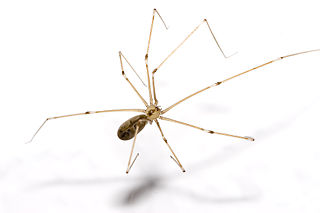
The Pholcidae are a family of araneomorph spiders. The family contains more than 1,800 individual species of pholcids, including those commonly known as cellar spider, daddy long-legs spider, carpenter spider, daddy long-legger, vibrating spider, gyrating spider, long daddy, skull spider, and angel spider. The family, first described by Carl Ludwig Koch in 1850, is divided into 94 genera.
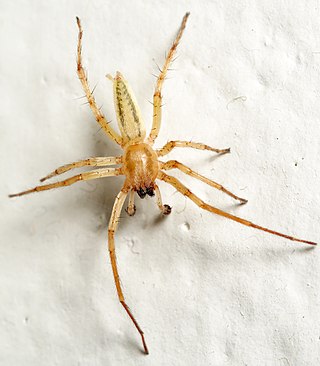
Anyphaenidae is a family of araneomorph spiders, sometimes called anyphaenid sac spiders or ghost spiders. They are distinguished from the sac spiders of the family Clubionidae and other spiders by having the abdominal spiracle placed one third to one half of the way anterior to the spinnerets toward the epigastric furrow on the underside of the abdomen. In most spiders the spiracle is just anterior to the spinnerets.

Velvet spiders are a small group of spiders almost entirely limited to the Old World, with the exception of one species known from Brazil. In Europe, some are commonly called the ladybird spiders.
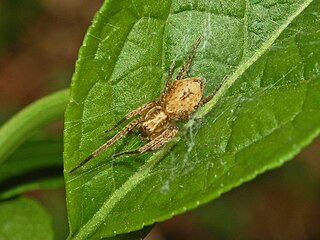
Anyphaena is a genus of anyphaenid sac spiders first described by Carl Jakob Sundevall in 1833.
Acantheis is a genus of Asian wandering spiders first described by Tamerlan Thorell in 1891.
Australoechemus is a genus of West African ground spiders that was first described by Günter Schmidt (arachnologist), M. Geisthardt & F. Piepho in 1994. As of May 2019 it contains only two species, both found on the Cape Verde islands: A. celer and A. oecobiophilus.
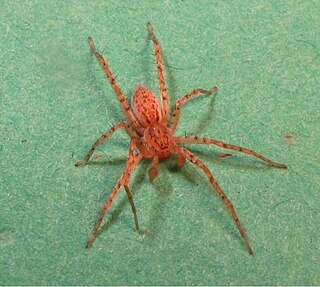
Anyphaena fraterna is a species of ghost spider in the family Anyphaenidae. It is found in the USA.
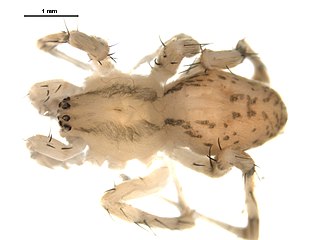
Anyphaena pectorosa is a species of ghost spider in the family Anyphaenidae. It is found in the United States and Canada.
Anyphaena californica is a species of ghost spider in the family Anyphaenidae. It is found in the United States.

Anyphaena pacifica is a species of ghost spider in the family Anyphaenidae. It is found in the United States and Canada.
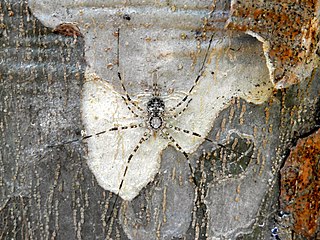
Neotama mexicana, also known as the long-spinneret spider or Mexican two-tailed spider, is a species of tree trunk spider in the family Hersiliidae. It is found in a range from the United States to Peru and Guyana.
Anyphaena dixiana is a species of ghost spider in the family Anyphaenidae. It is found in the United States.
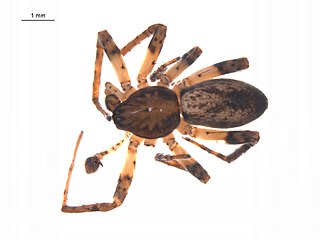
Anyphaena aperta is a species of ghost spider in the family Anyphaenidae. It is found in the United States and Canada. It has adapted to the presence of Australian tea tree plants as an invasive species in North America, using said plants as habitat.

Mecaphesa celer, known generally as the swift crab spider, is a species of crab spider in the family Thomisidae. Its range is quite large, and it is found throughout much of North and Central America.

Anyphaena accentuata is a species of spider in the Order Araneae.
Sinophaena is a small genus of east Asian anyphaenid sac spiders. It was first described by Y. J. Lin, Yuri M. Marusik and C. X. Gao in 2021, and it has only been found in China. As of November 2021 it contains only two species: S. bivalva and S. xiweni.












